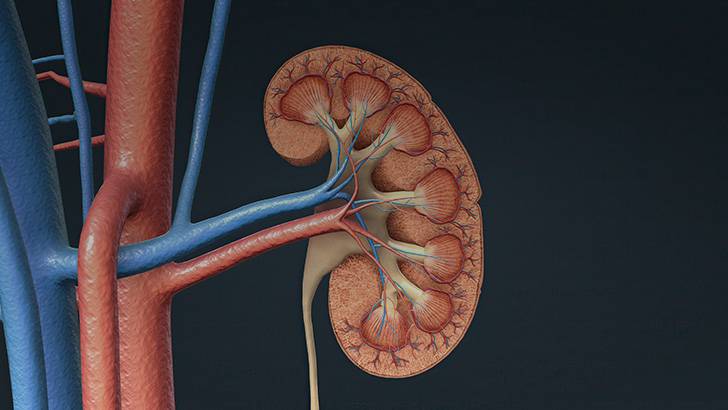Announcer:
Welcome to CME on ReachMD. This episode is part of the Global Kidney Academy and is brought to you by Medtelligence.
Prior to beginning the activity, please be sure to review the faculty and commercial support disclosure statements as well as the learning objectives.
Dr. Jayne:
We know ANCA [antineutrophil cytoplasmic antibody]-associated vasculitis can lead to long-term organ damage and carry significant mortality risk. While treatment with glucocorticoids is effective, there are disadvantages in terms of adverse events and impaired quality of life for patients. Given these unmet needs, and with respect to the guidelines and current treatments, is there a role for complement receptor inhibition in ANCA-associated vasculitis treatment and management?
This is CME on ReachMD, and I’m Dr. David Jayne.
Dr. Bruchfeld:
And I’m Dr. Annette Bruchfeld.
Dr. Jayne:
So, Annette, let’s answer that important question by starting with a patient case. The case presentation is a 61-year-old woman diagnosed with microscopic polyangiitis with biopsy-confirmed renal involvement 5 years ago, and she was treated then with cyclophosphamide and corticosteroids. This resulted in a stable chronic kidney disease with a glomerular filtration rate of 60 mL/min, and she became ANCA negative. Currently, the patient is experiencing her first relapse and is now ANCA positive. In the initial presentation, she had lethargy, fever, and joint pain. She’s got an elevated BMI at 28.9, and the laboratory tests have demonstrated proteinuria with hematuria, a fall in her glomerular filtration rate down to 44.1 mL/min, and the quantification of a proteinuria is with a urinary albumin-creatinine ratio of 127. I mentioned that she had had prednisone and cyclophosphamide in the past, and currently the patient’s quite anxious that she’s getting worse and it’s getting more difficult to exercise or walk up and down the stairs.
Do you have any comments in particular about the laboratory findings and this type of common clinical presentation?
Dr. Bruchfeld:
Yes. I think this patient, it’s important to consider that she has already been treated. While she has some damage from her first diagnosis, she has already had CKD, and she’s obese. And I also would like to know more about the muscle weakness that she seems to have. Is that something that she had before or is something that can get worse if we give her even more glucocorticoids at this time?
Dr. Jayne:
Yes, I think given that she’s been treated before, she is at higher risk of treatment-associated toxicity, particularly with steroids, and also with her elevated body mass index and anxiety, these can correlate with further problems such as
weight gain and mood disorder with the steroids. And we do now know that complement pathways are important in ANCA vasculitis, which is now giving us new opportunities for treatment. But I also think it’s important to clarify her diagnosis of microscopic polyangiitis. There really was little here to suggest she’s got granulomatous disease, which would move her into a diagnosis of GPA, or granulomatosis with polyangiitis, and we’re aware that quite recently the American College of Rheumatology and EULAR [European Alliance of Associations for Rheumatology] have issued classification criteria that can help a physician differentiate between the 2 syndromes.
Now, Annette, what do the standard of care guidelines tell us about managing this patient?
Dr. Bruchfeld:
So there are new guidelines, at least in the last couple of years, from the American College of Rheumatology, KDIGO [Kidney Disease: Improving Global Outcomes], and also, very recently published, the EULAR guidelines. And they all have slightly different takes on remission induction, but what is a common feature is the low-dose glucocorticoids and the, in some cases, also, if there is a possibility to use avacopan, that should be at least considered or also recommended once it’s more available, which is not everywhere yet. So I think that the glucocorticoid-sparing feature has already been a big interest the last couple of years. There were several trials that have used a low-steroid regimen, or at least tried it, and that has been associated with equal effect and not substandard effect, and also with fewer infections, which is the major issue with using high doses of glucocorticoids.
So when choosing cyclophosphamide or rituximab, there are several advantages to rituximab, especially in patients where you repeat treatment, that you avoid some of the toxicity, for instance, malignancy. And also fertility is an important topic in younger patients, whereas the risk of infection is not that different between the 2 treatments. But there are specific features of rituximab which can lead to especially repeated doses of hypogammaglobulinemia with an increased rate of infection. And in the last year, last couple of years with the pandemic, we have understood that using rituximab makes it a bit more problematic with the vaccine, and then the vaccine effect is lower in rituximab-treated patients.
But in general, this glucocorticoid tapering or avoidance is becoming an important feature in vasculitis patients. And with the emerging therapies with this deeper knowledge of the complement system and the use of complement C5a inhibitors in trials, that’s an important step forward for treating our patients and reducing toxicity.
Dr. Jayne:
Yes, and I would add, just adding what you were saying about steroid regimens, we do now have, really for the first time, randomized control trials showing that you can more rapidly reduce steroids without losing efficacy, particularly in the case of vasculitis affecting the kidney, and that was seen in the PEXIVAS trial. But nevertheless, even with these regimens, patients still experience quite a bit of glucocorticoid toxicity because the regimens start with quite high dose. And I think, particularly in patients with relapsing disease, there’s a desire to try and avoid steroids. And, of course, the patients will be aware of the steroid-related side effects they’ve had before, and the patients are often very keen themselves to try to avoid a return to those side effects. And always, the worry with steroids is there are the side effects you see in short term, but we worry about long-term morbidity and infection risk of cumulative steroid exposure.
And so in terms of emerging therapies, we do have the complement C5a inhibitors, and we have some quite elegant research that has demonstrated that this pathway, complement C5a, appears critical to the development of vasculitis, at least in experimental models, and the data from human trials is fairly consistent with C5a inhibitors in the clinic.
For those just tuning in, you’re listening to CME on ReachMD. I’m Dr. David Jayne, and here with me today is Dr. Annette Bruchfeld. We’re discussing how to treat and manage ANCA-associated vasculitis, including the potential role of complement receptor inhibitors, using a patient case study.
Dr. Bruchfeld:
So, David, based on what we just heard, what would you do for this patient?
Dr. Jayne:
Well, I think the most important thing is to start treatment immediately. You don’t want to waste time once you’ve reached a diagnosis. Some might want to consider repeating a kidney biopsy, but I think in this case, with an active urine, the return of ANCA, and probably some constitutional symptoms, I would start treatment straight away.
Now this patient would have met the eligibility for the ADVOCATE trial, which was a randomized controlled trial which compared avacopan to a prednisone taper regimen, both these drugs given against a background of either rituximab or cyclophosphamide, followed by azathioprine. And I think the ADVOCATE trial demonstrated that those patients given avacopan were more likely to have sustained remission at 12 months, but of particular relevance to this patient, had much reduced steroid exposure, reduced steroid toxicity, a better recovery of quality of life, and better recovery of kidney function. And we always worry about relapsing patients affecting the kidney because these patients have a particularly high risk of progressing to end-stage renal disease. So there are several bits of evidence from the ADVOCATE trial that suggests that avacopan would be an alternative therapy to consider in this patient.
Annette, you mentioned the EULAR guidelines, which I’m glad to say are now in press, and these do recommend avacopan when it is desirable to avoid steroids. I think when you’re assessing a patient and trying to decide what treatment to give the patient, then assessing comorbid risks, such as diabetes, hypertension, obesity, malignancy risk, is a very important part of the physician reaching a decision on the best treatment to use.
And in terms of this discussion of how you identify whether a patient would benefit from avacopan as opposed to standard therapy with glucocorticoids, there are several conclusions that we can draw from ADVOCATE of those that will particularly benefit. And I think those patients in whom we think are at particularly high risk of steroid toxicity, those patients in whom their disease is probably not well controlled with whatever therapy they’re on, assuming they’ve had an adequate trial, and those patients with a reduced GFR. And I think the patient that we presented earlier in this talk really meets 2 of these criteria, so I think avacopan should certainly be considered.
In terms of safety, there was no major safety risk in ADVOCATE between those treated with avacopan and those treated with prednisone taper, although numerically there were a reduced number of serious adverse events in the avacopan group compared to the steroid group. But I think what’s important if you’re considering using avacopan is to make that decision quickly and to start the drug quickly, because the benefit is going to be up front because that is usually when you have to deliver the high doses of steroids. So I think if you delay the initiation of avacopan, then you miss a lot of the advantages of being able to minimize and withdraw steroids rapidly.
In terms of what you monitor when you commence a patient on complement inhibition therapy, in fact, it’s just the same things as we would monitor with all our patients: the hematology, the kidney function, and liver function and so on. And with respect to a patient with nephritis, we’ll be regularly monitoring the proteinuria, looking for microscopic hematuria, and monitoring kidney function.
Well, this has certainly been a fascinating conversation. Before we wrap up, Annette, can you share your one take-home message with our audience?
Dr. Bruchfeld:
It’s important to get an early diagnosis and also to recognize an early relapse and treat quickly to avoid the damage. And also use less toxic treatment, which will translate into better effects and also a better quality of life for the individual patient.
Dr. Jayne:
Yes, and I think my take-home message is with complement inhibition therapy, we have an alternative now. And as a physician, you always want alternatives because you’re then going to be able to deliver the best combination of drugs for your patient and achieve the best outcomes.
Unfortunately, that’s all the time we have today, so I want to thank our audience for listening and thank you, Dr. Annette Bruchfeld, for joining me and for sharing all of your valuable insights. It was great speaking with you today.
Dr. Bruchfeld:
Thank you very much, David, and goodbye.
Announcer:
You have been listening to CME on ReachMD. This activity is provided by Medtelligence.
To receive your free CME credit, or to download this activity, go to ReachMD.com/Medtelligence. Thank you for listening.

 In support of improving patient care, Global Learning Collaborative (GLC) is jointly accredited by the Accreditation Council for Continuing Medical Education (ACCME), the Accreditation Council for Pharmacy Education (ACPE), and the American Nurses Credentialing Center (ANCC) to provide continuing education for the healthcare team.
In support of improving patient care, Global Learning Collaborative (GLC) is jointly accredited by the Accreditation Council for Continuing Medical Education (ACCME), the Accreditation Council for Pharmacy Education (ACPE), and the American Nurses Credentialing Center (ANCC) to provide continuing education for the healthcare team.



Facebook Comments